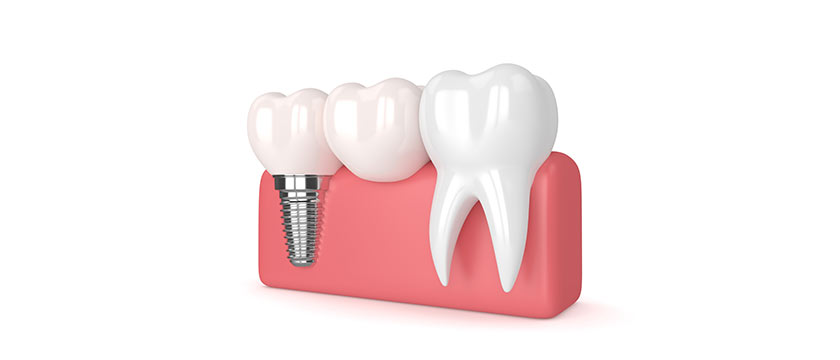How Do You Know If You Will Need A Bone Graft?
Your dentist may speak to you about a bone graft if he or she believes that your jaw is too soft or too think to support the dental implant securely. In the event that your jaw cannot support the implant properly, your implant surgery will not work.
If you have had periodontal disease, an infection in your jaw, decay or an injury your jaw may not be strong enough to support your implant. Usually bone loss occurs in these cases, and the jaw will experience some deterioration.
If you have lost several teeth, or lost teeth a long time ago it is also quite likely that you have experienced bone loss in your jaw and your dentist will recommend a bone graft before placing dental implants.
Not everyone who needs dental implants needs to have bone grafting.
How Does A Bone Graft Work?
Dental implant surgery is generally performed in different stages. The first stage is usually the extraction of the damaged tooth. The second stage is to prepare the jaw for surgery.
During the bone graft procedure the surgeon will remove some bone from a different part of your body, and then graft it into the desired position in your jaw. In most cases there may be a waiting period, to see if the graft can stimulate new bone growth to support your dental implants.

The surgeon will place the grafted bone on the exposed area, as it contains the proteins and collagens that are required for bone to grow.
In some cases, only minor grafts are required, and these can be performed on the same day as your dental implants are placed.
Once your dentist is satisfied with the outcome of the bone graft and that adequate healing has taken place, he or she will go ahead with the implant surgery. The titanium implant will be placed into the jawbone, and then given time to heal. Once the implant site has healed the abutment will be placed in the jaw and given time for the soft tissue to heal.
Will Bone Grafting Hurt?
Thanks to advances in modern dentistry bone grafts are minimally invasive procedures that are largely painless. In most cases they are performed in-office and may even be done following tooth extraction.
In addition, your dentist might also speak to you about other procedures, which will provide further support for bone growth.
These procedures may include sinus lift, to provide more space in your upper jaw so that your dental implants receive more support. Ridge expansion may be recommended to make your upper jaw wider. Distraction osteogenesis is the process by which a short bon can be made longer. By cutting the bone and pulling them slowly apart, new bone is encouraged to grow in the space between.
Bone grafting for dental implants is an essential process if your jawbone is not strong enough to support your implants. Speak to one of our friendly dentists about your bone grafting options and start reaping the benefits of dental implants today: (02) 8503 9902.






I lost my tooth when I was 18. Now that I’m financially able I want too replace my bridge with crowns and an implant. However, my oral surgeon said I needed a bone graft. I was super nervous about it because it just sounds awful. My surgeon has been pretty good about explaining but this write up just gave some more useful information and encouragement that set my mind at ease. Thank you so much for sharing this.
I would like to get an implant to replace my painful and wiggling crown. The second molar space however is just empty gum. I was hoping to have the implant placed without a bone graft ’cause I’m just totally mortified of the idea of it. However, this post appears to be pretty good about explaining things. I will hang onto the positive things I’ve gotten from here as I am sure I will freak out when the implant part rolls around.
Good read! I’m facing bone grafting but it had put me off as it sounds like a terrible ordeal to go through. However when I read this post it surprisingly sounded less unpleasant than I had convinced myself it would be. At this point I am eager to keep the process moving so I could finish my treatment as soon as possible.
My bridge finally broke after a lot of years. After what I learned about implants, I wanted to give it a go. However, my dentist wants to to do a bone graft before he places them. While my Dr was explaining why, it just seemed like it would be too much for me. I mean I knew nothing about bone grafting and it can be a little scary when a procedure sounds strange and unfamiliar.Thank goodness I found this post. Now that I understand more about bone grafting, I feel a bit at ease with the procedure as I seem to feel with having dental implants placed.